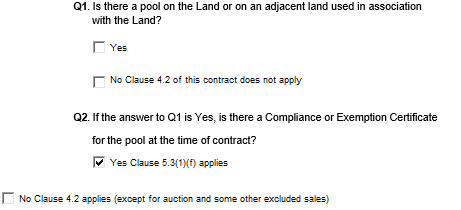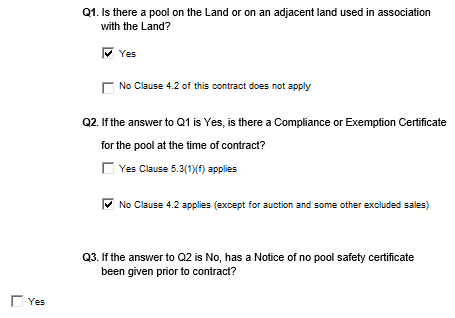Drownings in home swimming pools are a tragic and all too common occurrence. Pool safety laws have reduced the number of drownings, and are an important factor in the sale of properties with pools. As conveyancing experts, we advise buyers and sellers of their responsibilities and ensure that the contract proceeds smoothly in this area.
From 1 December 2015, Queensland’s swimming pool safety laws have been amended to require all pools, whether at home, at a hotel, resort or otherwise, to have a Pool Safety Certificate. The certificate is evidence that a pool complies with the various pool safety regulations, including the rules relating to pool fences and safety signs.
As properties with pools have gone to market post December 2015, the Pool Safety Certificate has often come up as an issue.
An owner may not necessarily have realised that they needed a Pool Safety Certificate, but the buyer will, in most cases, want to see that one exists.
The way the standard contracts deal with pool safety is confusing and the pool safety section of the standard contracts is, in a lot of cases, not completed correctly. This blog article will provide you with some insight!
What are my pool safety obligations as owner?
If you own a pool on residential land, then you will be required to comply with the pool safety laws. The laws are also wide enough to cover pools in community title schemes and pools in all various types of accommodation settings.
However, it is important to note that the laws do not apply to ponds or pools used for ornamental purposes, dams or tanks used for storage of water, watercourses, portable wading pools or a spa bath with a depth of less than 300 millimetres.
If your home has a pool, you have an obligation to hold a Pool Safety Certificate.
If you have the right to access a pool because your property is within a community title scheme arrangement, the body corporate is required to hold a pool safety certificate. The body corporate must make it available for all unit owners, however not every single unit owner has to obtain a separate pool safety certificate for the same pool. One for the whole complex suffices.
If a pool is newly built, a building certifier is able to provide a Form 17 – Final Inspection Certificate which is equivalent to a Pool Safety Certificate.
There can be penalties imposed if you do not obtain a Pool Safety Certificate or if you do not register your pool on the Pool Safety Register. The penalties are usually imposed by the local councils, however the QBCC (Queensland Building and Construction Commission) can also penalise you if you fail to hold a current Pool Safety Certificate. The fines can vary between hundreds to thousands of dollars, so it is important that you keep your certificates up to date!
How do I get a pool safety Certificate?
You need to find a licensed Pool Safety Inspector who is registered with QBCC and they will carry out the necessary inspections for you.
There are different companies who can do this for you and the prices vary accordingly. However, each and every inspector has a certain code of conduct they must follow to ensure they are doing their job properly so that your pool can be kept safe.
The inspector will come out to your property to inspect the pool(s) and ensure that it meets the legislative requirements before deciding whether to issue a Pool Safety Certificate or not.
If your pool is not compliant with construction or safety requirements, then the inspector will issue a Notice of Nonconformity. This notice sets out what needs to be fixed before a Pool Safety Certificate can be issued.
Pool inspectors can conduct minor works to make the pool meets the requirements for a Pool Safety Certificate to then be issued. You must make sure that the inspector is allowed to carry out these minor works, and the value of the work cannot exceed $3,300.00. You can give the QBCC a call to find out if the inspector is able to do these works, or they can provide you with their QBCC licence for your information.
What do I do if I have a Pool Safety Certificate?
Prior to settlement or at settlement, you must give the buyer a copy of the Pool Safety Certificate.
If you are using an REIQ standard contract to sell your house, you can complete the pool safety section of the contract as follows:

What do I do if I don’t have a pool safety certificate?
There are essentially two ways of dealing with this issue –
- Complete the questions in the pool safety section of the contract and allow the contract to be subject to a Pool Safety Certificate issuing; or
- Put in a special condition requiring the seller to give the buyer a Pool Safety Certificate prior to settlement.
We usually see the second option being taken up, because it is usually better for both parties. This is because the buyer is not required to organise and pay for a pool safety inspection. The seller, in turn, has control over making sure that at a Pool Safety Certificate gets issued and there is no risk of the buyer using the pool safety condition to terminate the contract.
Completing the contract
When there is no Pool Safety Certificate, the seller must tick ‘no’ to Question 1 (indicating that there is no compliance or exemption certificate in existence).
The seller must also provide the buyer with a Form 36 Notice of No Pool Safety Certificate.
Example of how to complete the contract must be completed in this case follows below:

Organising a Certificate?
If the pool safety section is completed on the contract as above, then the contract is conditional upon one of the following being issued by the Pool Safety Inspection Date:
- A Pool Safety Certificate; or
- A Notice of Non Conformity advising of the works required to be conducted for a Pool Safety Certificate to be issued.
The Buyer is required to organise and pay for the Pool Safety Inspection. If the pool is compliant, the inspector will issue a Pool Safety Certificate and the contract can continue. If a Notice of Non-Conformity is issued, then the buyer can terminate the contract.
In practice, a special condition is inserted requiring the Seller to obtain a Pool Safety Certificate.
This article sheds some light on how the Pool Safety Laws work and how they affect buying and selling property. We are experts in this area. Please feel free to contact the Property Team at FC Lawyers and we will assist you with any specific questions you may have.
The information provided in this article is for general information and educative purposes in summary form on legal topics which is current at the time it is published. The content does not constitute legal advice or recommendations and should not be relied upon as such. Whilst every care has been taken in the preparation of this article, FC Lawyers cannot accept responsibility for any errors, including those caused by negligence, in the material. We make no representations, statements or warranties about the accuracy or completeness of the information and you should not rely on it. You are advised to make your own independent inquiries regarding the accuracy of any information provided on this website. FC Lawyers does not guarantee, and accepts no legal responsibility whatsoever arising from or in connection to the accuracy, reliability, currency, correctness or completeness of any material contained in this article. Links to third party websites or articles does not constitute any endorsement or approval of those sites or the owners of those sites. Nothing in this article should be construed as granting any licence or right for you to use that content. You should consult the third party’s terms and conditions of use in relation to any third-party content. FC Lawyers disclaims all responsibility and all liability (including liability for negligence) for all expenses, losses, damages and costs you might incur as a result of the information being inaccurate or incomplete in any way. Appropriate legal advice should always be obtained in actual situations.
Prefer to get in touch?
With offices in Brisbane, Sunshine Coast, North Queensland and Sydney, our team is well equipped to provide both advice and support across a broad range of legal areas.
